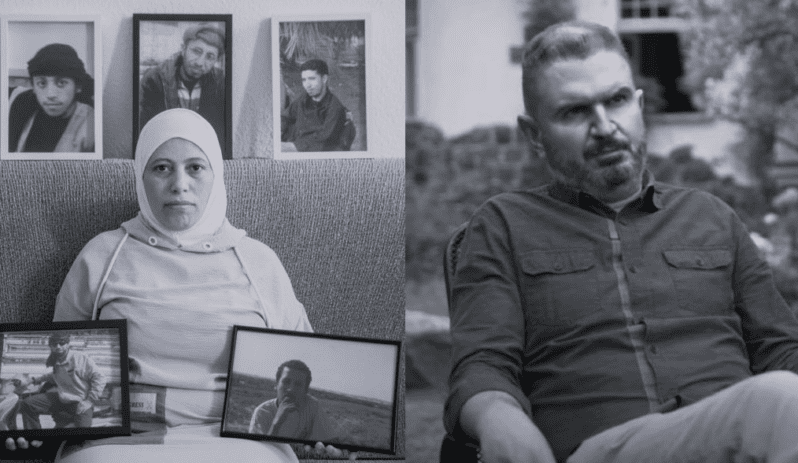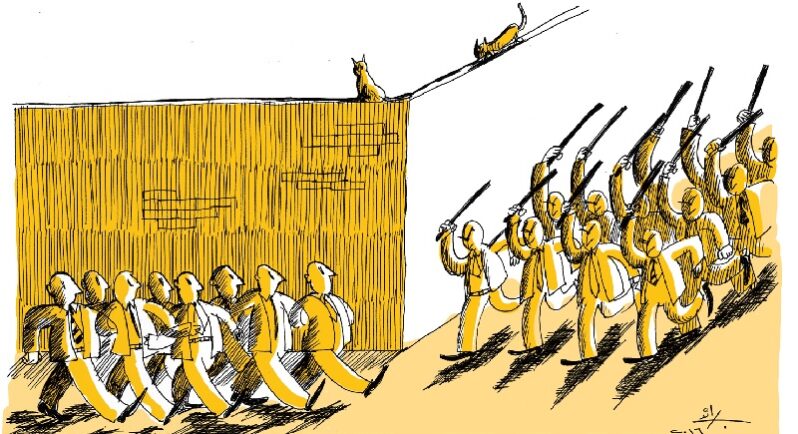Accusing Aboutrika: Taking Terror Laws Lightly

On January 12, 2017, the sixth division of the Criminal Court of Greater Cairo ruled to add 1,502 individuals to lists of terrorists, at the request of the public prosecutor and in accordance with the Terrorist Entities Law. Among the names added was former international and Egyptian football player Mohamed Aboutrika. The most famous and talented player in the history of Egyptian football, Aboutrika is known among Egyptians as the “Prince of Hearts”. For 20 years he brought joy to football fans in Egypt, as well as to Arab and African countries.
The decision was handed down in accordance with a ruling issued by the Cairo Summary Affairs Court on September 23, 2013, banning the Muslim Brotherhood and freezing its assets and business operations. Aboutrika was included because he was a partner in one of the Brotherhood’s private tourist companies. However, Aboutrika had appealed the decision to freeze his assets –which had been issued by the committee in charge of the Muslim Brotherhood’s assets– before the State Council’s Administrative Court. The appeal was nominally accepted, and the court ruled to suspend the freeze of the former Ahly and Egyptian and national team player. This was an indication that Aboutrika was not considered a terrorist, and that he had not participated in terrorist activities in any way.
Hence, the Criminal Court’s decision to include Aboutrika’s name was a surprise to everyone – not only because of his fame and distinguished sports record in Egypt, but also because his name topped a list of 1,502 individuals and was followed by names such as: Mohamed Morsi, Mahdi Atef and Mohamed Badie, former supreme guides of the Muslim Brotherhood; Sheikh Yusuf al–Qaradawi, the preacher living in Qatar; and, Saad al–Katatni, who was the Speaker of Parliament during the Brotherhood rule.
The Criminal Court’s decision had huge reverberations in public opinion, both in Egypt and abroad; Aboutrika’s following spans the Arab world and beyond, and he is known for his humility, his good character, his kindness in dealing with others, and his charitable donations to the poor and needy. There is no doubt he will appeal the decision to the relevant chamber of the Court of Cassation. The window for such an appeal is 60 days from the decision’s publication in the Egyptian Official Gazette.
This article will not discuss the court’s decision in terms of the reasons it was issued, or the supporting investigations and evidence presented. Rather, we suggest that the Terrorist Entities Law itself, which the court was implementing in issuing its decision, demands further examination and discussion.
The law authorizes adding names to the terrorist lists by way of legal decisions that in reality amount to judicial rulings designating accused individuals as terrorists –with all the legal ramifications of that designation– but without proving them guilty on actual charges of terrorism. In fact, these are imposed penalties or precautionary measures that are not preceded by a legal trial, in which the accused is given the opportunity to defend themselves, either in person or by proxy. The inclusion of Aboutrika on the terrorist list was said to be justified on the basis of his partnership in a company owned by the Muslim Brotherhood, or that he donated money to the protestors at Nahda and Rab’a al–Adawiya squares during the June 30, 2013 revolution. Such allegations would require an investigation, as well as a legal proceeding that aimed to arrive at the truth of the matter, and to hear the defense of the accused. All this could lead to an acquittal of the charges.
The reasons provided in the decision stated the following.
In view of supporting the Muslim Brotherhood organization’s armed movements and terrorist operations by way of assets provided to its members and supporters via the owners of economic entities, as well as entities owned by the organization itself, and as authorized by Khairat el-Shater, deputy leader of the organization, the organization’s leaders and cadres and supporters associated with businessmen and owners of assets in order to finance the sit-ins at Rab’a and al-Nahda as well as armed elements of the organization during the sit-ins, and mobilized them to commit hostilities that included burning churches, blocking roads, targeting members of the armed forces and police, and terrorizing citizens. This was done with the aim of disturbing public order, to the point of taking down the government by force.
This reasoning may well apply to some of those whose names were added to the list, but the question is: has any of this been confirmed in the case of Aboutrika, and subsequent to the date when the Terrorist Entities Law came into force? Until a ruling is issued from the relevant chamber of the Court of Cassation, nothing from the decision to add his name can be inferred by way of an answer to this question.
The provisions of the Egyptian Constitution clearly and explicitly state that an accused person is innocent until proven guilty in a court of law, where they are guaranteed the right to defend themselves (Article 96). It also guarantees the right to defend oneself in person or by proxy (Article 98). Moreover, the Universal Declaration of Human Rights –which Egypt has ratified and has the force of law, according to Article 93 of the Constitution– provides guarantees of a fair trial, and states that the accused is innocent until proven guilty, and that the right to defense is guaranteed.
The 2015 Terrorist Entities Law (see a brief overview of the law below) is not in compliance with the constitutional regulations and international human rights guarantees regarding the rights of an accused person, or suspect. The process of adding a name to the terror list does not require a trial, and therefore does not respect the right to legal defense. Nothing is mentioned of the right of the accused to appeal the addition of their name to the Court of Cassation; such an appeal process would indicate that the criminal court’s decision was in fact a judicial ruling carrying penal implications. Instead, it is clear that the fact of being placed on the list is itself a punitive measure put into place absent the commission of a specific crime, and without a judicial ruling. Moreover, the actions cited as justifying this measure –that is, belonging to the Muslim Brotherhood, having Brotherhood sympathies, or funding them prior to the June 30, 2013 revolution– preceded the Terrorist Entities Law and were not criminal behavior, as far as we know, before that time. This itself is a violation of Article 95 of the Egyptian Constitution.
The decision that added names to the terrorist list was not limited to individuals charged for crimes of terrorism by the judiciary. For some, the designation as terrorist had not been previously established. For example, the decision included university professors, doctors, engineers, and businessmen who had never appeared before the court in connection with any crime. Their names were entered, rather, because of their positions or duties, or participation in associations or charitable institutions, or their donations to charity, largely within Egyptian society. The state itself calls upon citizens to donate to educational, charitable, and social institutions and activities.
We hope that the appeal of the Criminal Court’s decision to add some of these individuals to the terrorist list, which will be brought before the Court of Cassation, leads to a discussion of the constitutionality of the Terrorist Entities Law. We also hope that the Supreme Constitutional Court rules on the extent to which some of the law’s statutes conform with the provisions of the Egyptian Constitution, which establishes the “rule of law” as the basis of governance within the state.
But until the Supreme Constitutional Court rules on the constitutionality of the law (or lack thereof), the terrorist designation will apply to anyone whose name was added to the list. Some of the individuals added to the list as a result of the Criminal Court’s decision have not even been proven to have donated to non–accredited charitable institutions. Until the Court of Cassation rules on the appeal of the Criminal Court’s decision, Aboutrika remains on the list. That the former Egyptian national team player remains on a list of terrorists eludes the understanding of many who love “the Magician”, not only in Egypt but throughout the sporting worlds in the Arab region and internationally.
The fact that a law allowing such decisions remains in place likewise demands an examination of how it was issued and passed by the Egyptian parliament, without any comment on the constitutional deficiencies that pervade its provisions. As long as the judicial rulings that will determine the fate of the law are still pending, the law remains a gun held to the head of human rights organizations and activists. It is easy to label any institution or association defending human rights as a terrorist entity or terrorist simply by adding them to the lists of the security apparatus, issuing a decision through the Criminal Court, and thereby forcing the affected party to resort to the Court of Cassation.
The label “terrorist” is not only a criminal designation, but a disgrace to a person’s dignity. And yet the Terrorist Entities Law may confer this label upon an individual who has not committed crimes that warrant the label, materially or morally. The label might be applied to someone whose participation in a crime –whether by agreement, incitement, or assistance– has not been proven in any way, and with no evidence of their approval or encouragement of terrorism. Aboutrika has not committed any specific criminal behavior; if he had, he would have been arrested and given a criminal trial in order to defend himself. We have no knowledge that he incited terrorism or agreed with the commission of terrorist crimes, or that he materially aided such crimes or applauded them, or called for them in any manner.
About the Terrorist Entities Law
The Terrorist Entities Law was issued via presidential decree No. 8 of 2015, and published in the Official Gazette the day it was issued; it took effect the following day, on February 18, 2015. The law is one of a series of laws aimed at fighting terrorism, which has worsened in terms of its threat and scope in the wake of the June 30, 2013 revolution. By their nature, these laws restrict freedoms.
The law includes 10 articles. The first defines a terrorist entity with an extensive and elaborate definition that includes nearly every activity considered to be criminal according to the Penal Code. A terrorist, according to this article, is “any natural person who commits, aims to commit, incites, threatens, or plans, domestically or abroad, a terrorist crime in any manner, whether individually or by participating in said crime in the context of a joint criminal enterprise, or assumes a leadership or administrative role, or who founds or establishes or participates as a member in any terrorist entity as specified in Article 1 of this law, or who finances such an entity or knowingly participates in its activities”.
The law’s second article specifies how to initiate the process of adding a name to the lists of terrorists and terrorist entities. It stipulates that the public prosecutor should prepare a list of entities (referred to as the list of terrorist entities) that includes entities specified by the court for inclusion, as well as those against whom final criminal judgements have been issued that confer this label. The public prosecutor also prepares a list of people (the list of terrorists), according to the same criteria applied to entities.
The third article states that one or more divisions of the Appeals Court of Cairo should be designated, as determined by the plenum of the court each year, to hold sessions to consider requests regarding additions to these two lists (i.e., of terrorists, and of terrorist entities).
These requests are presented by the public prosecutor to the designated chamber, accompanied by the results of investigations and evidence supporting the request. The chamber must rule on the request within seven days of receiving it, assuming the necessary evidence is included. Notably, the chamber is to issue a reasoned decision regarding additions to the lists without requiring the presence of the individual being considered, informing them of the request before it is reviewed, or hearing their defense or discussion regarding the evidence presented by the public prosecutor in support of their inclusion in the lists.
Should an individual be added to the list, the following consequences take effect.
-
The person is added to travel–ban and pre–arrival screening lists; foreigners are banned from entering the country;
-
Their passport is confiscated or cancelled, and they are banned from having a new passport issued;
-
Loss of the good name and reputation required to assume governmental and elected positions and posts; and
-
The freezing of assets used in the commission of terrorist activities.
All authorities, institutions, bodies, and apparatuses of the state are required, within the scope of their jurisdictions, to enact and implement these consequences, and to inform the relevant authorities, domestic and abroad, to implement them regarding those who have been included on either list.



